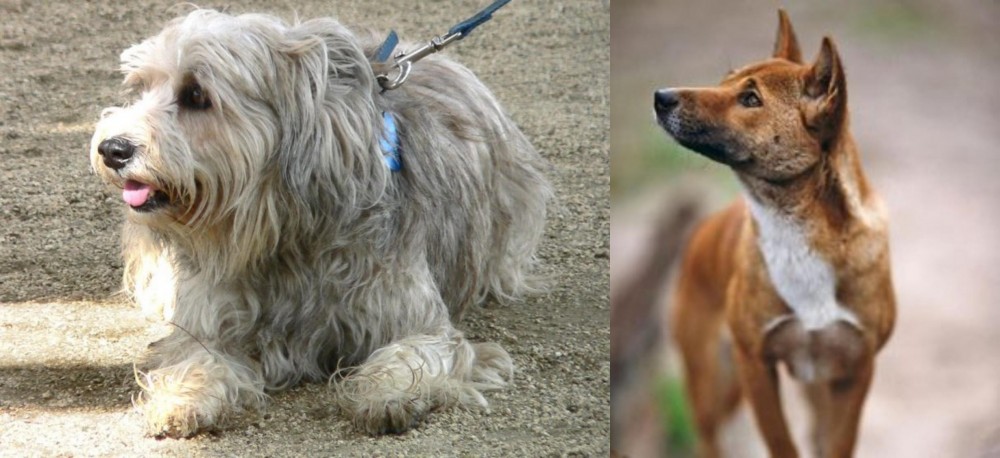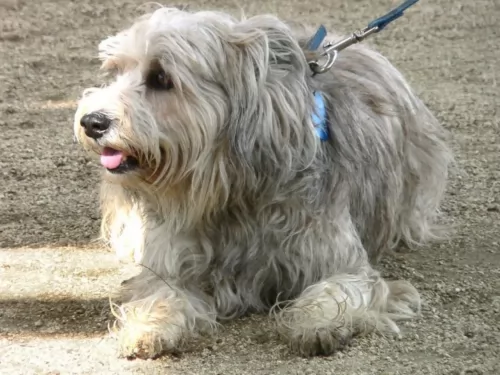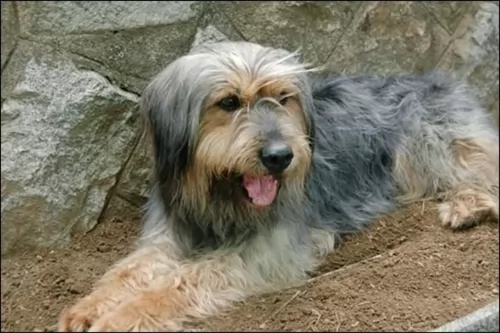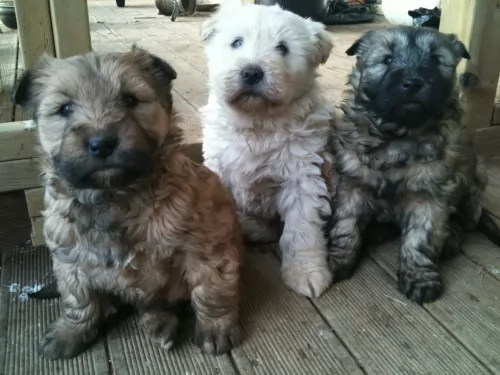 Petzlover
Petzlover Sapsali is originated from North Korea but New Guinea Singing Dog is originated from Papua New Guinea. Sapsali may grow 22 cm / 9 inches higher than New Guinea Singing Dog. Sapsali may weigh 12 kg / 27 pounds more than New Guinea Singing Dog. Sapsali may live 8 years less than New Guinea Singing Dog. Both Sapsali and New Guinea Singing Dog has almost same litter size. Both Sapsali and New Guinea Singing Dog requires Moderate Maintenance.
Sapsali is originated from North Korea but New Guinea Singing Dog is originated from Papua New Guinea. Sapsali may grow 22 cm / 9 inches higher than New Guinea Singing Dog. Sapsali may weigh 12 kg / 27 pounds more than New Guinea Singing Dog. Sapsali may live 8 years less than New Guinea Singing Dog. Both Sapsali and New Guinea Singing Dog has almost same litter size. Both Sapsali and New Guinea Singing Dog requires Moderate Maintenance.
 Early documentation of this dog tells us that it has been around for centuries and is therefore an ancient breed.
Early documentation of this dog tells us that it has been around for centuries and is therefore an ancient breed.
The Sapsali is a dog that comes from Korea and is also known as the Lion Dog, Sapsaree and Sapsal Gae. It is believed that these dogs were used to dispel evil spirits or ghosts.
The dog was given the status as National Treasure by the Korean Government in 1992 and is recognized by a number of local Korean dog societies. The dog isn’t however recognized by any of the major kennel clubs, but is affiliated with the Federation Cynologique Internationale (FCI).
When Korea was under Japanese rule, the dogs were slaughtered to make coats for its military and almost became extinct. Kennels were set up and the dog was revived again in the 1980s.
 In 1957 the New Guinea Singing Dog was “discovered” in the Highlands of Papua New Guinea and he is found no where else. There is a lot of debate among scientists, taxonomists and biologist as to what is really a species and what is a subspecies. When the NGSD was found he was classified as a new canid species then in 2007 they were downgraded to a subspecies.
In 1957 the New Guinea Singing Dog was “discovered” in the Highlands of Papua New Guinea and he is found no where else. There is a lot of debate among scientists, taxonomists and biologist as to what is really a species and what is a subspecies. When the NGSD was found he was classified as a new canid species then in 2007 they were downgraded to a subspecies.
Today the NGSD is considered to be a wild dog and a primitive dog. They have lived in Papua New Guinea in the Highlands for thousands of years. They are closely related to other wild dogs, such as Australia’s dingo. They are today as they were a thousand years ago – wild. So wild that many counties have them in their zoos.
With the right care and enough socialization, they do very well as companion animals living with people. They are difficult to domesticate however and the person who owns one should be a part of the NGSD community in order to get support, share issues, and learn from others who have lived with these “wild dogs” for many years.
Any New Guinea Singing Dog found in North America or Europe is a direct descendent of two couples that were taken to zoos in China and Australia. The NGSD makes a howling sound that modulates and undulates through a wide series of tones. No other dog makes this musical sound. Rare even in New Guinea today, the Singer is thought to be the rarest of all dogs.
The only organization that recognizes the Singing Dog is the UKC and they are allowed in UKC competition. The NGSD now holds the classification of a domestic dog – a Canis lupus dingo - which is a subspecies of Canis lupus. In 2016 a group of 15 wild dogs were photographed for the first time ever. Prior to this the NGSD were never seen in more than pairs.
It is believed that they do not live and operate in packs, but rather solitary, pairs or family groups where both the parents do the work of raising the pups.
 The Sapsali is a medium sized sheepdog standing at between 48 and 60cm in height and weighing between 16 and 27kg. He is a strong looking dog with the coat being long and dense and coming in quite a few color varieties. The coat can be solid in color but it can also be a mixture of blonde, reddish, brown and black. The hair of the dog also falls over the eyes.
The Sapsali is a medium sized sheepdog standing at between 48 and 60cm in height and weighing between 16 and 27kg. He is a strong looking dog with the coat being long and dense and coming in quite a few color varieties. The coat can be solid in color but it can also be a mixture of blonde, reddish, brown and black. The hair of the dog also falls over the eyes.
The dog has large eyes, the ears are also fairly large and the tail is long and held straight or down.
The dog is friendly, social and playful and also loving and loyal towards his human family. He is protective too and makes a good watchdog, but is never aggressive.
He gets on well with children as well as with other dogs. Training and socialization ensure obedience and good behavior and with a desire to please.
They’re intelligent dogs and training is easy. They’re gentle dogs too and this has made them a popular choice for therapy dogs. Their loving natures have been welcomed by patients suffering with trauma and the dog connects strongly with these people.
When back home he wants to be included in all the family activities. He is quite energetic and will require exercise every day – walks, hikes, frisbee, ball and rope games as well as more hectic hikes. He makes a good choice for the first time dog owner but is better suited to life in the suburbs or the countryside as opposed to being on a small property in the city.
 The New Guinea Singing Dog is a medium sized dog with short legs and a broad head. They are about average height and they are very limber and flexible. They can rotate their paws and spread their legs at much greater angles than the average canine. Thus, they can easily climb a tree. They can jump like a cat.
The New Guinea Singing Dog is a medium sized dog with short legs and a broad head. They are about average height and they are very limber and flexible. They can rotate their paws and spread their legs at much greater angles than the average canine. Thus, they can easily climb a tree. They can jump like a cat.
They have very reflective eyes that are shaped like almonds and have dark rims. The color of the eye can be dark brown to dark amber. It is also believed that they can see better than other domestic dogs in low light settings. Their pupils let in more light due to pupils that are wider than most other dogs.
The ears of the NGSD are lined with fur, pointed and erect. The are forward laying and can be rotated in order to hear even the farthest and faintest of sounds. There are dark guard hairs on the spine and back of the ears and tail. On young dogs the muzzle is black but by age 7 it is already beginning to turn gray.
 The beautiful Sapsali is a friendly, loving dog breed who is just a little bit wary around strangers.
The beautiful Sapsali is a friendly, loving dog breed who is just a little bit wary around strangers.
If he senses his master is alright around strangers, he will accept them too.
He is both protector and guard dog and gets on well with all members of the household. Apart from the long coat which can be a bit of a handful, this dog ticks all the right boxes in terms of being a most splendid family pet.
 They could be, but it must be remembered that this is a wild dog.
They could be, but it must be remembered that this is a wild dog.
Varying the pitches when howling
It’s possible but not recommended. Leave them wild.
Highly intelligent but trainability is questionable unless well socialize and attached to their people.
 The Sapsali can live to be between 10 and 12 years of age, being a healthy breed. Like all purebreds, the dog will experience some health concerns, among which are heart disease, obesity, bloat, hip dysplasia and skin problems among others.
The Sapsali can live to be between 10 and 12 years of age, being a healthy breed. Like all purebreds, the dog will experience some health concerns, among which are heart disease, obesity, bloat, hip dysplasia and skin problems among others.
Dogs get heart disease just like human beings. The most common form of heart disease in dogs is valvular disease. Essentially it affects small breed dogs. Heartworm disease and dilated cardiomyopathy are also common forms of heart disease.
Sometimes there are symptoms and sometimes there aren’t, but as heart disease progresses it turns to congestive heart failure – the heart not being able to meet the body’s demands. Signs of this can be fatigue, difficulty with breathing, loss of appetite and weight loss, coughing and a distended abdomen.
If you see these signs, your pet will need to get to the vet. There is no cure for congestive heart failure but there are medications which can help the heart work better.
 Though the breed is not extinct – it is so wild and secretive that there is no history or record of any health problems. However, the small number of domestic companion animals have shown health issues in recent years.
Though the breed is not extinct – it is so wild and secretive that there is no history or record of any health problems. However, the small number of domestic companion animals have shown health issues in recent years.
Pancreatitis – can be chronic or acute. If chronic it needs to be treated and diet changed. If acute it is usually deadly.
Hip Dysplasia – can cause lameness or arthritis.
 The Sapsali is covered in thick, long hair and the coat is going to require a lot of attention. It will be better to give the coat a brush every day as the coat can become very matted and tangled. The dog is also a heavy shedder so a regular brush will help to get rid of all that loose hair.
The Sapsali is covered in thick, long hair and the coat is going to require a lot of attention. It will be better to give the coat a brush every day as the coat can become very matted and tangled. The dog is also a heavy shedder so a regular brush will help to get rid of all that loose hair.
The Sapsali will need to have his ears, eyes and teeth regularly checked to ensure they are clear of any infection and to prevent any illnesses. A bad tooth can create many health issues throughout the dog’s body.
You can enhance your dog’s health by giving him good food. Commercially manufactured dog foods can be a good, convenient choice, more so if you choose the high quality ones known for their natural, quality ingredients.
To provide your dog with just a bit of variety in his diet, some home-made food added into the dry kibble from time to time will delight your pet. No need to make preparing the food a huge issue either. Boil brown rice and chicken in a pot and add in sweet potatoes, carrots and spinach.
Chop all this up and as a treat, add smaller portions of it into the dry kibble when you want to treat your dog. To avoid skin infections, try to include some raw meat into his diet occasionally. Never leave your pet without a constant source of fresh, cool water
 In the wild both pups and adults are thought to eat small mammals and birds as well as fruits. In homes feed a high protein diet. Because of the tendency toward pancreatitis do not feed raw or under cooked meat. If feeding meet do so in small amounts well cooked, very lean. Stay away from the fat. Feed puppies very small amounts. ¾-1 cup high quality dry puppy food twice a day.
In the wild both pups and adults are thought to eat small mammals and birds as well as fruits. In homes feed a high protein diet. Because of the tendency toward pancreatitis do not feed raw or under cooked meat. If feeding meet do so in small amounts well cooked, very lean. Stay away from the fat. Feed puppies very small amounts. ¾-1 cup high quality dry puppy food twice a day.
Same as the puppy when it comes to meat although you could give the adult a little more. 1 ½ cups od high quality medium breed dog food twice a day.
In the wild there is no indication of health issue. A very healthy breed.
The NGSD needs a lot of stimulation both mental and physical. They must have a daily walk and somewhere to run. They are escape artist in homes. Remember they can jump like cats and climb trees. If their head can pass through a hole, so can the rest of their body.